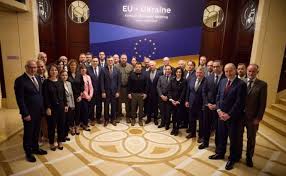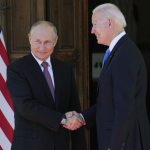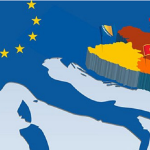The summit meeting of the heads of foreign policy departments of 27 European Union countries taking place in Kyiv has rightfully become one of the most discussed events in international politics and the world press. According to analysts, the event significantly improved the image of Ukraine in the world, and also became a “new impetus” for the development of functional relations between the EU members themselves. What is so sensational about the mentioned summit?
There is no definite (or rather, clear) answer to this question. And, apparently, it won’t. The very fact of holding the meeting has already become a sensation of sorts. The summit took place in the capital of a state that is not a member of the United Europe. Its meetings were held in actual “military conditions” – to the sound of air defense sirens and in conditions of a real danger of bombing from outside. And finally, almost all high-ranking European diplomats took part in it – even those who had previously declared themselves “exceptionally busy.”
On the eve of the Kyiv meeting, EU High Representative for Foreign and Security Policy Josep Borrell visited Ukraine on an unannounced visit. Inspecting facilities in Odessa that were attacked by Russian missiles, he promised the city additional funds to restore destroyed buildings, and Ukraine as a whole – an additional 5 billion euros to support infrastructure. Subsequently, already on the sidelines of the summit, the commissioner guaranteed official Kyiv “unlimited support from Europe.”
Other forum participants spoke in the same vein in Kyiv. True, in your own words. For example, German Foreign Minister Annalena Bärbock said in her emotional speech that Ukraine “has already earned the right to be part of the European Union.” And she added that in the foreseeable future the same EU will stretch from Lisbon to Lugansk. Latvian State Secretary Andris Pells spoke in a more restrained tone. According to him, Brussels will do everything possible to ensure that Ukraine integrates into the EU “in the coming years.”
“There was a completely justified impression that, by accepting the invitation to the Kiev summit, high-ranking European politicians once again provided Ukraine with a kind of carte blanche to join the EU,” said European political commentator Marie Pudeba in a commentary for EURO-ATLANTIC UKRAINE. “This is both a tribute and a tribute to Kiev’s struggle against Russian occupation, and a symbol of Brussels’ faith in the sincerity of Ukraine’s intentions to follow all integration rules and recommendations.” In addition, according to the expert, the mentioned forum clearly demonstrated to Russia the unshakability of the EU’s plans regarding Ukraine.”
It seems that the latter opinion is shared by the President of Ukraine Vladimir Zelensky. Commenting on the preliminary results of the summit, he emphasized that a new stage has emerged in relations between Brussels, which will bring Ukraine as close as possible to the United Europe.
And it’s hard to disagree with this.


